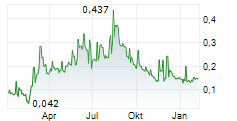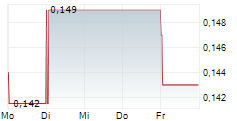
STOCKHOLM, SWEDEN / ACCESSWIRE / May 13, 2024 / AlzeCure Pharma (STO:ALZCUR)(FRA:AC6) AlzeCure Pharma AB (publ) (FN STO:ALZCUR), a pharmaceutical company that develops candidate drugs for diseases affecting the nervous system, focusing on Alzheimer's disease and pain, today announced that the company has received preclinical data for NeuroRestore in inflammation, with relevance to Alzheimer's disease, and submitted a new patent application for NeuroRestore ACD856, which is now being prepared for phase II clinical studies.
"Alzheimer's disease as well as other neurodegenerative diseases are characterized by an inflammatory process in the brain. Prolonged inflammation, with the release of inflammatory and toxic substances, can cause damage and nerve cell death. That we can target these inflammatory processes is something that further opens up new possibilities for ACD856," said Pontus Forsell, Head of Discovery and Research at AlzeCure.
New preclinical data show that the NeuroRestore substance ACD856 exhibits anti-inflammatory properties both centrally in the brain and peripherally in the body with relief of clinical inflammatory symptoms in preclinical models and a reduction in several inflammatory markers. These new data indicate an opportunity to treat diseases with elements of neuroinflammation, such as Alzheimer's disease, and that ACD856 can have a disease-modifying effect via its anti-inflammatory properties.
ACD856 and the other substances in the NeuroRestore platform stimulate several important signaling systems and signaling substances in the brain such as BDNF (Brain Derived Neurotrophic Factor) and NGF (Nerve Growth Factor), which can lead to improved cognition. Previous preclinical studies have shown that AlzeCure's drug candidates strengthen communication between nerve cells and improve cognitive ability, including learning and memory functions. New preclinical results also show potential neuroprotective and disease-modifying effects with these substances. The biological mechanism behind NeuroRestore enables several indications, such as Alzheimer's and Parkinson's disease, but also depression.
"We continue to strengthen the patent portfolio for our NeuroRestore program, and already have approved patents in all major markets such as the USA, Europe, Japan and China. The new results for our clinical drug candidate ACD856, which we are preparing for phase II against Alzheimer's, provide further evidence for a disease-modifying effect as well as general use against neurodegenerative diseases, where neuroinflammation is central. This further improves our commercial opportunities for this promising substance," said Martin Jönsson, CEO.
For more information, please contact
Martin Jönsson, CEO
Tel: +46 707 86 94 43
martin.jonsson@alzecurepharma.com
About AlzeCure Pharma AB (publ)
AlzeCure® is a Swedish pharmaceutical company that develops new innovative drug therapies for the treatment of severe diseases and conditions that affect the central nervous system, such as Alzheimer's disease and pain - indications for which currently available treatment is very limited. The company is listed on Nasdaq First North Premier Growth Market and is developing several parallel drug candidates based on three research platforms: NeuroRestore®, Alzstatin® and Painless.
NeuroRestore consists of two symptomatic drug candidates where the unique mechanism of action allows for multiple indications, including Alzheimer's disease, as well as cognitive disorders associated with traumatic brain injury, sleep apnea and Parkinson's disease, as well as for depression treatment. The Alzstatin platform focuses on developing disease-modifying and preventive drug candidates for early treatment of Alzheimer's disease and comprises two drug candidates. Painless is the company's research platform in the field of pain and contains two projects: ACD440, which is a drug candidate in the clinical development phase for the treatment of neuropathic pain, and TrkA-NAM, which targets severe pain in conditions such as osteoarthritis. AlzeCure aims to pursue its own projects through preclinical research and development through an early clinical phase, and is continually working on business development to find suitable outlicensing solutions, alternatively partnership, with other pharmaceutical companies.
FNCA Sweden AB is the company's Certified Adviser. For more information, please visit www.alzecurepharma.se.
About NeuroRestore
NeuroRestore is a platform of symptom-relieving drug candidates for disease states in which cognitive ability is impaired, e.g. Alzheimer's Disease, sleep apnea, traumatic brain injury and Parkinson's disease. NeuroRestore stimulates several important signaling pathways in the brain, which among other things leads to improved cognition. Preclinical studies with NeuroRestore have shown that AlzeCure's drug candidates enhance communication between the nerve cells and improve cognitive ability. The NeuroRestore substances are so called Trk-PAMs which stimulate specific signaling pathways in the central nervous system known as neurotrophins, the most well-known being NGF (Nerve Growth Factor) and BDNF (Brain Derived Neurotrophic Factor). The levels of NGF and BDNF are disturbed in several disease states and the signaling is reduced. The impaired function impairs communication between the synapses, i.e. the contact surfaces of the nerve endings, as well as reducing the possibility of survival for the nerve cells, which gives rise to the cognitive impairments. Neurotrophins play a crucial role for the function of nerve cells, and a disturbed function of BDNF has a strong genetic link to impaired cognitive ability in several different diseases, such as Alzheimer's, Parkinson's disease, traumatic brain injury and sleep disorders. There is also a link between BDNF signaling and depression, something that has been further strengthened in recent years. In addition to cognitive-enhancing effects, new preclinical data also show that NeuroRestore substances have a positive effect on mitochondrial function and cell survival, which could indicate potential disease-modifying effects. The leading drug candidate in the platform, ACD856, has recently completed clinical phase I studies and demonstrated positive effects there that support continued development of the program.
About Alzheimer's disease
Alzheimer's disease is the most common form of dementia, affecting approximately 55 million people worldwide. Alzheimer's disease is a lethal disorder that also has a large impact on both relatives and the society. Today, preventive and disease modifying treatments are missing. The main risk factors to develop Alzheimer's are age and genetic causes. Even though the disease can start as early as between 40 and 65 years of age, it is most common after 65 years. Significant investments in Alzheimer research are being made because of the significant unmet medical need and the large cost of this disease for healthcare and society. The total global costs for dementia related diseases are estimated to about 1,300 billion USD globally in 2019. Given the lack of both effective symptomatic treatments and disease modifying treatments, the need for new effective therapies is acute. The few approved drugs on the market today have only a limited symptomatic effect and can produce dose limiting side effects. A disease modifying treatment for Alzheimer's disease is estimated to reach more than $15 billion in annual sales. In Sweden, approximately 100,000 people suffer from Alzheimer's disease with a healthcare cost of about SEK 63 billion yearly, which is more than for cancer and cardiovascular diseases combined.
Image Attachments
Martin Jönsson CEO And Pontus Forsell Head Of D&R AlzeCure Pharma
Attachments
AlzeCure reports anti-inflammatory effects with NeuroRestore ACD856 with relevance to Alzheimer's leading to new patent application
SOURCE: AlzeCure Pharma
View the original press release on accesswire.com




